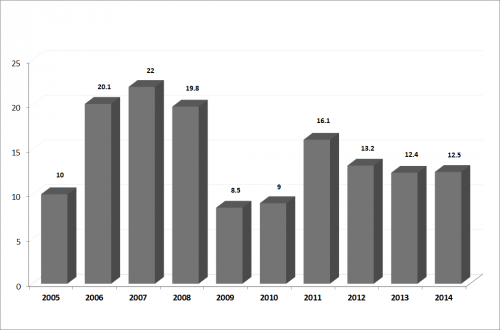18th February 2015
Business in Turkey: the rules of the game
 British people are often accused of using too many sporting metaphors. Expression such as “a good innings” (doing well but nearly finished) or “a sticky wicket” (a hard-to-defend situation) come from cricket. Others, eg “game, set and match” (the contest has ended) or “ the ball’s in your court” (it’s up to you to make the next step) come from tennis.
British people are often accused of using too many sporting metaphors. Expression such as “a good innings” (doing well but nearly finished) or “a sticky wicket” (a hard-to-defend situation) come from cricket. Others, eg “game, set and match” (the contest has ended) or “ the ball’s in your court” (it’s up to you to make the next step) come from tennis.
Others come from football: we all know the meaning of “kick-off” or “shown the red card”.
In business life, and in the battle by all countries to secure overseas investment, one of the most important sporting metaphors is “a level playing field”.
In business, a “level playing field” means all companies involved in an activity have equal chances. The opposite is a situation where a company has an unfair advantage over others.
Why does this matter so much to Turkey?
The answer is that, Turkey like all big economies, needs investment from the rest of the world to maximise its economic potential. In recent years, the United Kingdom has been one of the biggest foreign investors in Turkey. British companies often come to me and say that they are keen to invest more in Turkey. I like to encourage them. Such investment can boost Turkish productivity and exports, pay the wages of Turkish workers and reduce prices for Turkish consumers.
At present, Turkey’s record on inward investment is mixed. FDI flows can be volatile for all countries. Turkish figures show an upwards jump from 2010 to 2011 to $16 billion, but a decline since then to around $12.1 billion in 2014.
FDI Inflow to Turkey (USD billion)

Turkey’s average of $12.0 bn over the period 2009-2014 is respectable, but less than some other countries – for example, Brazil received an average of $62.1 billion of inward investment each year from 2010-2013. Turkey’s gross FDI stock is fairly low amongst G20 countries as a percentage of GDP.
Other indicators include the World Bank’s “Ease of Doing Business” index. For 2015, this shows Turkey rising to 55th place out of 189 countries – just ahead of Italy – compared with 69th a year earlier. Transparency International’s Corruption Perceptions Index for 2014 shows Turkey falling from 50th place in 2013 – a little ahead of the Czech Republic – to 64th place in 2014 – a whisker in front of Greece and Bulgaria. These figures all affect foreign investors’ views as they try to decide where to invest.
The top question which foreign investors ask me when they are considering investing in Turkey – or, if they have invested already, are considering investing more – is “is there a level playing field?”
What companies mean is: in the world of Turkish business, do the authorities treat all companies equally? Or do the authorities give some companies who are close to them special privileges in a non-transparent way?
Foreign companies – including from Britain – need to be 100% confident that, if they make a big investment in Turkey, they will be treated fairly and the same as other companies from Turkey or elsewhere.
This really matters. If the perception grows amongst international businesses that the Turkish authorities sometimes favour some companies for reasons of political favour or nationality, that will harm Turkey’s chances of winning inward investment. Conversely, if Turkey is perceived as a country where the rule of law runs deep and companies are treated equally, foreign investors will flock to make the most of the immense opportunities which Turkey has to offer.
In fact, to mix my sporting metaphors, by guaranteeing a level playing field and by avoiding moving the goal posts, Turkey will get a good track record on inward investment; make the cut; and keep scoring holes in one.
Attracting inward investment is a marathon, not a sprint.